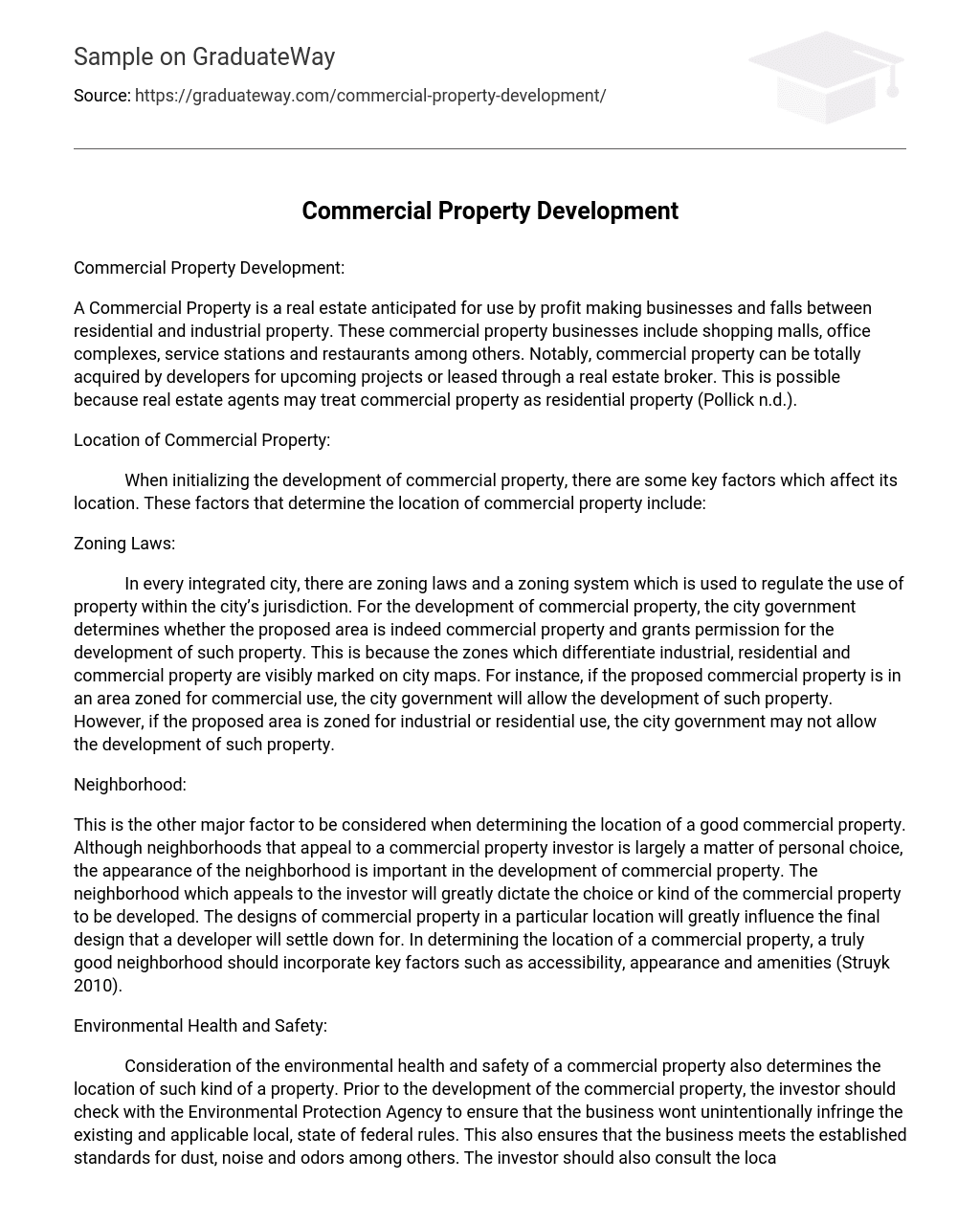Introduction
A commercial property is real estate intended for use by profit-making businesses and falls between residential and industrial property. Examples of commercial properties include shopping malls, office complexes, service stations, and restaurants. Developers can acquire commercial properties for upcoming projects, or they can be leased through a real estate broker. Real estate agents may treat commercial property as residential property (Pollick n.d.).
When initiating the development of commercial property, several key factors affect its location. These factors include:
Zoning Laws
In every integrated city, there are zoning laws and a zoning system used to regulate property use within the city’s jurisdiction. The city government determines whether proposed areas are commercial property and grants permission for development. This is because zones differentiating industrial, residential, and commercial properties are visibly marked on city maps. For instance, if the proposed commercial property is in an area zoned for commercial use, the city government will allow development. However, if the proposed area is zoned for industrial or residential use, the city government may not permit development.
Neighborhood:
When determining the location of a good commercial property, another major factor to consider is the neighborhood. While personal choice largely influences which neighborhoods appeal to commercial property investors, the appearance of the neighborhood is important in developing commercial property. The investor’s preferred neighborhood greatly dictates the choice and type of commercial property to be developed. The designs of existing commercial properties in a particular location also influence a developer’s final design choices. A truly good neighborhood for a commercial property should incorporate key factors such as accessibility, appearance, and amenities (Struyk 2010).
Environmental Health and Safety:
Consideration of the environmental health and safety of a commercial property is crucial in determining its location. Prior to developing such a property, investors should check with the Environmental Protection Agency to ensure compliance with local, state, and federal regulations. This also guarantees that the business meets established standards for dust, noise, odors, and other factors. Additionally, investors should consult local and state fire marshals for building and fire safety codes as well as Occupational Safety and Health Administration (OSHA) requirements for employee safety (BNET Editorial n.d.).
Centrality:
Centrality is a major factor in determining the location of a commercial property and how much an investor will pay for its development. Land is a limited commodity, so areas that are highly developed and have minimal chances of additional growth tend to have higher prices compared to areas with room for expansion. When purchasing an existing commercial property, investors should consider sources of information about the specific property they are looking for. There are several sources available that provide information on where to find particular properties.
Economic Factors Affecting Commercial Property Development
There are several economic factors that affect the development of commercial property, such as:
Financing:
This is a major economic factor that affects the development of commercial property. No business can exist without constant financing. Despite differing conditions and situations, commercial property is typically financed for close to 25 years through loans amounting to 60 or 70 percent of the property’s valuation. As a result, lending financial institutions charge customary fees and expect a security deposit. Various sources of funding include small business administration and local banks.
Government Economic Policies:
Government regulations and economic policies are other economic factors that affect the development of commercial property. The government institutes legal jurisdiction that specifies the forms of ownership a business can take while creating a body of commercial laws for each type of business. Tax regulations are some of the government policies that have an economic impact on the development of commercial property. These tax regulations and laws have different structures for different businesses, affecting the structuring and financing of the commercial property, sustainability of the business, funding, and taxation (Structuring & Financing,” n.d.).
Conclusion
In conclusion, the location of a commercial property is crucial in its development. Lot location refers to the specific area where the property will be situated. For example, if it is located on a busy highway, its price may be relatively low because fewer people will have time to stop and make purchases. Similarly, if it is situated in a residential area with noise from passing vehicles, the price may also decrease.
References
- BNET Editorial n.d., Acquiring Commercial Property,” BNET: The go-to place for management, viewed on 11 May 2010, http://www.bnet.com/2410-13056_23-64248.html
- Pollick M n.d., “What is Commercial Property?” WiseGeek, viewed on 11 May 2010, http://www.wisegeek.com/what-is-commercial-property.htm
- Struyk T. (2010). “The Five Factors of a ‘Good’ Location.” Yahoo Real Estate. Viewed on 11 May 2010, http://realestate.yahoo.com/promo/the-5-factors-of-a-good-location
- “Structuring and Financing” n.d., Structuring & Financing Commercial Property Developments. Conferenz: Bright Star viewed on May 11th,2021, http://www.conferenz.co.nz/conferences/structuring-and-financing-commercial-property-developments





